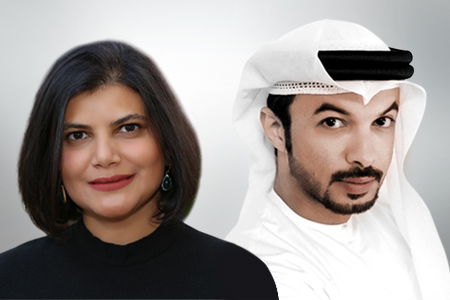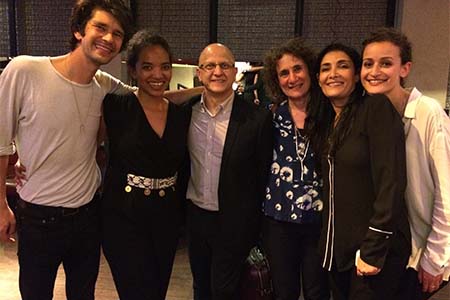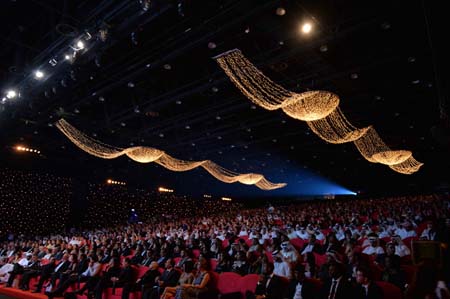The Dubai International Film Festival (DIFF) will highlight the GCCs most exciting new films of 2014 with its Gulf Voices programme, which this year will showcase a line-up of premieres from some of the regions best talent. The 11th edition of DIFF is set to run from December 10 to 17, 2014. Gulf Voices supports […]
The Dubai International Film Festival (DIFF) will highlight the GCCs most exciting new films of 2014 with its Gulf Voices programme, which this year will showcase a line-up of premieres from some of the regions best talent. The 11th edition of DIFF is set to run from December 10 to 17, 2014.
 Gulf Voices supports the brightest new directors, honouring a new generation of filmmakers and providing a platform for innovative Arabic cinema that offers a unique perspective on life and society in the Gulf. The vibrant film community in the region is going from strength to strength, producing a diverse collection of creative films that continue to attract a growing audience at home and abroad.
Gulf Voices supports the brightest new directors, honouring a new generation of filmmakers and providing a platform for innovative Arabic cinema that offers a unique perspective on life and society in the Gulf. The vibrant film community in the region is going from strength to strength, producing a diverse collection of creative films that continue to attract a growing audience at home and abroad.
DIFF Artistic Director Masoud Amralla Al Ali said: Our goal with Gulf Voices is to provide an unapologetic, insightful portrayal of life in the region while supporting exciting young artists. We look for those directors and actors who can tell a distinctive, powerful story that encapsulates the dreams and desires of Arab society in an honest and thought-provoking manner.
From Saudi Arabian film director Mohammad Alfarajs, the world premiere Compulsory takes on contentious issues by introducing us to Ahmed, a man who believes he has been rejected by society and who takes on roles and responsibilities that he believes will prove his worth. He works as a mortician and when he learns about organ donation, a radical idea comes to his mind. Does he go through with it?
Acclaimed Bahraini filmmaker Saleh Nasss Central Market supported by DIFFs post-production support programme Enjaaz is an entertaining story about a young boy who spends his afternoons working at the local market, carrying groceries and delivering produce. Inquisitive and entrepreneurial, he is always searching for the opportunity to make a quick dirham. One morning he finds his opportunity to make some serious cash by trying to milk a small goat in a nearby pen.
Bus 321 by filmmaker, Hussain Ali Almotlaq from Saudi Arabia in its world premiere and supported by Enjaaz, follows a 40-year-old man who previously worked as a school bus driver, driving Bus 321. The man was forced to leave his job after running over a young student. He cannot come to terms with the guilt and struggles to be near buses because of the memories they provoke. After a while, he gets a new job and is forced to travel by bus to his new place of work in the desert. A few surprise occurrences make him re-think his attitude and the film presents the man with a dilemma does he continue with his new job, despite being drawn back to the old bus, number 321?
Kuwaiti Director Sadeq Behbehani presents the world premiere of The Carpet, featuring Hammoud, who works in a store selling carpets. The story is set amongst a 1950s Kuwaiti government department just as the country is beginning to discover oil. Hammoud becomes embroiled in a plot to steal carpets from the warehouse, but such behaviour will not satisfy the needs of his family and Hammoud is forced to make some important decisions to overcome the conflict the carpet creates between the people he loves.
The world premiere Falafel Cart, by Kuwaiti director Abdullah Al-Wazzan, is an almost mythical tale about an unseen falafel cart owner, who slowly rediscovers his passion for cooking after stumbling upon an unusual flower that holds the essence of his tragic past.
From Emirati filmmaker Ahmed Abdulqader comes the world premiere of Tomorrow a documentary about the making of one of the most successful charity songs ever made in the Middle East. Tomorrow/Bokra features 24 artists from around the world and is produced by the legendary Quincy Jones and Badr Jafar. As of now the song has over 10 million views on Youtube and this documentary tells the remarkable behind the scenes story of Bokra.
The Enjaaz-supported world premiere A Long Night from Iraqi director Kamiran Betasi is a tense drama set against the backdrop of the failed Kurdish revolution of 1975. The story centres around a mother forced to flee with her children to a refugee camp on the Iranian border. In the camp of only women and children, an Iranian officer attempts to take advantage of his power.
Hassan in Wonderland is a world premiere from Iraqi director Ali Kareem Obaid that explores the ongoing effects of war. All the boys in Hassans neighbourhood play war; they shoot fake guns at each other, stage fake battles and pretend to die. Hassan prefers toy cars and one day he finds his wonderland in a car cemetery in Baghdad. Amongst the burned out skeletons of cars and old school buses the children play, but they cannot escape the suffocating effects of the war which destroys in more ways than one.
In Kuwaitis Yousef Al Bagshis animated short and world premiere Sandarah the protagonist is a young photographer who finds himself surrounded by hardened soldiers when he is forced into the Army. Whilst serving in a foreign country our artistic and innocent hero is confronted with a decision that will change his life forever.
Qarar is a world premiere from Qatari filmmaker Ali Al- Anssari. In his latest short film, a young couple in a post-apocalyptic future must make decisions with far reaching consequences. When every decision could mean life and death, Qarar asks would you sacrifice everything for the one you love?
In Iraqi filmmaker Sarmad Yassens short It Is White the helmet of a fallen soldier navigates its way through rivers and canals. Floating along the surface of the water, the helmet contains a precious cargo; the soldiers last words to his lover.
Rain on Jeekor is a world premiere from Iraqi director Joudi Alkinani. A short biographical film about poet Badr Shakir Al-Sayab, that charts the pivotal moments in a remarkable life. Despite his short life (he died at 38) he remains of the most influential Arab poets of the 20th century. The title Rain on Jeekor invokes both Al-Sayabs most famous poem Rain Song and his beloved hometown.















































































